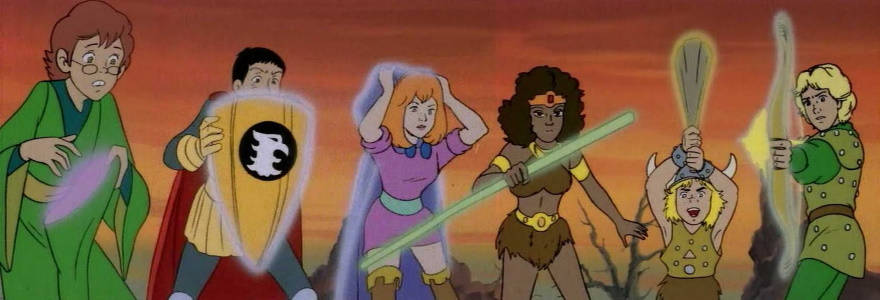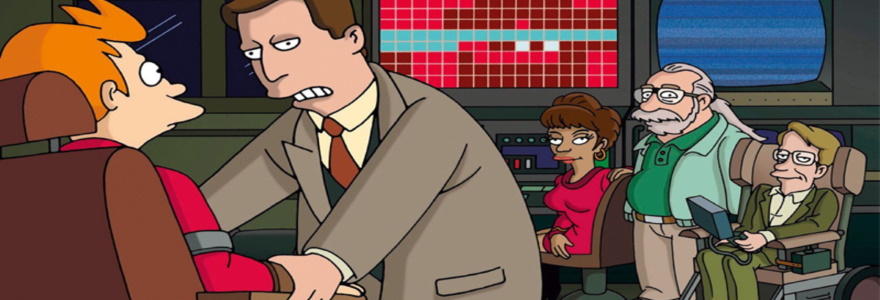
Part of the holy mission of the Game Archaeologist is to ferret out the roots of history that ultimately led to MMORPGs as we know them today. Another part of the mission is to root out ferrets, as my claw-scarred arms can attest. Some of that history is fairly recent, but today we’re going to travel back — way back — to a time before many of you were born. Including me, as a matter of fact.
The year is 1974. The world is hip-deep in the throes of shag carpeting, driftwood furniture, and the strains of Grand Funk Railroad. It truly seemed like nothing would ever be cool or non-earth-toned again. At this, the lowest moment in all of history, game designers Gary Gygax and Dave Arneson took the concept of miniature wargaming, merged it with a fantasy motif, and sold it under the name Dungeons & Dragons. Geeks everywhere had a reason to rejoice, and through this roleplaying game the foundations for MMOs were laid.
Let’s take a brief survey through D&D, giving special emphasis to how this great-granddaddy of RPGs passed down a legacy that we enjoy in our modern online titles. Also, there will be popcorn.
D&D cemented fantasy as the RPG norm
Dungeons & Dragons certainly did not create the fantasy genre, but Gygax and Arneson capitalized the crap out of it. During the 20th century, fantasy fiction saw a serious uptick in popularity and publication, from the works of C.S. Lewis, Robert E. Howard, J.R.R. Tolkien, Michael Moorcock and Jack Vance, to name a few. With college students proudly wearing their “Frodo Lives!” buttons and musical artists crafting albums with fantastical themes, it was time to strike while the nerd iron was hot.
Part of D&D’s genius is that it didn’t try to invent a completely new world with its own rules but instead borrowed, stole, copied, and paid homage to all of the great ideas that had gone before it. The designers pulled from every corner of fantasy fiction, mythology, and real-world inspirational sources to create a melting pot that had a little of something for everyone. The result became a universal fantasy, through which players could enjoy any of the worlds they already admired.
In just a few short years after the game’s launch, D&D became synonymous with “fantasy” — and RPGs had their progeny. While there would be other RPG genres to come — science fiction, horror, western, steampunk, cyberpunk, Hello Kitty — fantasy became the de facto norm. If you have a pet peeve about there being too many fantasy MMOs out there, it’s not entirely fair to blame D&D, however; chances are it would’ve been the case even if D&D never existed. It’s been generally proven that people can identify with and understand fantasy more easily than other fictional genres, partially because it draws from medieval history and real-world imagery.
D&D promoted roleplaying and socialization between gamers
While Dungeons & Dragons earned a stigma of being a game full of losers who played in their parents’ basements, an important point was missed: These “losers” were still getting together to socialize, interact, and have fun together. It beat the heck out of being isolated and alone, and with a common hobby to unite these people, friendships formed and supportive groups emerged. D&D became, essentially, the geek’s football — a “sport” that a group of friends got together to enjoy in a communal sense with snacks, shouting, groans of defeat and shrieks of victory.
One of the cornerstones of the game, roleplaying, became both divisive and beloved, depending on one’s perspective. While it’s understandable that many outsiders thought it was a bit barmy to see players talk in strange dialects, occasionally wear odd headpieces and refer to what sounded like Lovecraftian horrors, the truth was that D&D’s penchant for roleplaying had foundations in traditionally accepted pastimes. Children, after all, play-act through stories, and even some grown-ups in 1974 devoted their entire lives to performing as actors on the stage and the silver screen.
Stepping into the shoes of one’s character and living his, her or its adventures through imagination and game mechanics became an inseparable part of the D&D experience. Even as the genre changed and evolved to meet the needs and limitations of online gaming, roleplaying never died out. For some, it became a strictly internal experience, while others kept the spirit of D&Desque RPing alive on special servers and in RP-dedicated guilds.
D&D fine-tuned RPG game mechanics
Character sheets. Experience points. Hit points. Mana. Dungeon runs. Levels. Armor class. Skills. Inventory. Giant spiders.
If these sound completely familiar — almost mundane, really — it’s because D&D took the time to create, modify and fine-tune many of these game mechanics over the years. It’s hard to imagine playing an RPG without health or hit points, particularly when you get into combat. By taking the time to gradually educate gamers on these concepts while modifying them as the systems were extensively play-tested, the D&D team fashioned an entire encyclopedia of systems that future games and campaigns could use as an established foundation.
D&D was a pioneer of geek culture
Geeks certainly existed before and in spite of Dungeons & Dragons — don’t get me wrong. But it’s hard to deny that D&D was a huge influence in geek culture over the past 36 years. One of my earliest movie memories is E.T., a movie that featured characters playing D&D during a scene at the kids’ home. This demonstrated how the game had become a phenomenon at this point, pushing past the outskirts of the fringe to make inroads into the mainstream.
D&D has been featured in cartoons, comic books, a pair of really bad movies, and practically every geek convention that doesn’t have the words “Star” and “Trek” in the title (even so, Spock is really a Space Elf and Kirk a Chaotic Good Barbarian). Stranger Things catapulted Dungeons & Dragons right back into the forefront of geek culture when it came on the scene a few years ago. D&D helped to make it cool to be a geek, even as it bore the brunt of some ridicule and moral panic from time to time.
D&D served as inspiration for countless MMOs
Finally! MMOs! The thing we talk about on Massively OP almost as much as we talk about bandicoots! You knew we’d get around to it sooner or later.
The truth is that MMOs simply owe a huge tribute of thanks to D&D for the work that I’ve outlined already in this article as well as a whole lot more. Lord of the Rings and Dungeons & Dragons are almost, without exception, referred to whenever a new fantasy MMO comes to term — and for good reason. Because a bulk of gamers have difficulty accepting fantasy without the conventions and tropes established by these two franchises, MMOs typically follow suit or pay for being too out-of-the-box.
This isn’t always a good thing, mind you, but I’m still pretty grateful that MMOs had such a powerhouse of a pen-and-paper game to pull from when trying to get started, otherwise it might have been a lot longer until we would’ve seen online RPGs take off the way that they have.
It’s kind of amusing how MMOs, video games and D&D have looped around each other so many times by now that we’ve successfully achieved infinite geekery. At the same time as two D&D MMOs (Dungeons and Dragons Online and Neverwinter) are on the market, Dungeons & Dragons 5th edition draws inspiration from MMOs for some of its systems (and it even uses online tools to aid play).
Have a memory or two to share about your own Dungeons & Dragons experiences? Let’s hear about them in the comments, especially if they led you to playing MMOs later in life!
(I lied about the popcorn.)
 Believe it or not, MMOs did exist prior to World of Warcraft! Every two weeks, The Game Archaeologist looks back at classic online games and their history to learn a thing or two about where the industry came from… and where it might be heading.
Believe it or not, MMOs did exist prior to World of Warcraft! Every two weeks, The Game Archaeologist looks back at classic online games and their history to learn a thing or two about where the industry came from… and where it might be heading.


















